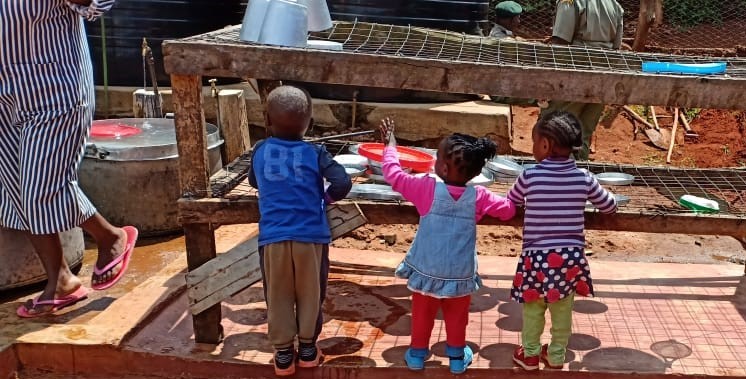Authored by: Nyambura Kogi and Mumbi Muguongo 30th September 2020
He went silent. For one whole year, Joe*, now 3½ years old, never uttered a word. Prisoners and the warders identified him as the toddler in a corner. He would rarely play, cry nor interact. Most of all, Joe never spoke. He never called his mother “mama” nor twaddle with another child.
Joe was the fourth child born to man and wife. They had always wanted a son. A son carried his father’s name for generations and inherited the land. A son would be the pride of the home; the head of household in the absence of his father. They had tried for a son. Three girls later, Joe was born. He brought jubilation to the home and pride to his parents. Now they had an heir. He was a normal child, accomplishing the stages of development. They beamed at the milestones. He held his neck , sat on his own, weaned, crawled, teethed, spoke and walked as a normal child would. There was a whole future ahead.
His grandfather’s family was huge. Brother after brother married and brought a wife home. They not only needed a house for each family, but also some fallow land for tilling. The piece of land was small. A land tussle brought strife to the larger family. Everybody had to secure their interests in that land. These disagreements endured and fights behind closed doors ensued.
The violence escalated to murder, when Joe’s father died by from panga inflicted injuries. His mother was the first suspect. Her late husband’s brother found her attempting to torch the body in the dead of the night. He screamed and a mob gathered. They came with torches and canes, screaming, baying for blood, the blood of a murderer they said. They surrounded her as she held Little Joe in her arms. it sealed her fate that she would die from mob justice.
Like the mob, the police too came immediately. Their first job was crowd control. His mother’s options were either a public lynching or the navy blue police “Mariamu” (Land Cruiser). She opted for the latter. She handed Joe over to an officer on the ground behind the police vehicle. No sooner had she set one foot in the back, than the vehicle geared off. 20-month old Joe was in a cloud of dust in a stranger’s arms.
He had neither eaten, nor breastfed for more than 12 hours. The mob shrieked on; they ranted, sang and tumulted. They broke off more branches and ran around . The officer too, now had to run. It was to save his own life and the life of the child of the ‘murderer’, who was on her way to face justice. Blood would pour, the crowd said. With their target whisked away it would be anybody’s blood!
Little Joe and the officer arrived at the Police station 8 hours later. Joe was stiff from crying, his diaper full, reeking and leaking. He maintained a piercing and glassy stare; one that seemed to pierce the soul. It was also like his own soul had escaped that dainty body. He was back in his mother’s arms again but he neither cried, nor spoke. They never heard his voice again, for the next one year. Not his mother, not other children, not the officers. This was his reality now. He had taken in silence, the raucous of the crowd, a deceased father and an imprisoned mother.
The courts charged Joe’s mother with murder. She had stayed in a cell with Joe for 10 days before her arraignment. She is now in capital remand and has been there for over a year, as her case drags on. With the option of bail for every charge in Kenya, hers remains denied. Her late husband’s family demands so.
Little Joe lives with her in prison, until he is four and can no longer. Then, he will be under the care of the remaining family, if they are willing to. Otherwise, he will go to a government children’s home. His speech is re-developing, but for a 3 ½ year- old, but his tongue is heavy. He is active around other children and can feed. The doctor’s examination determined that he was well, at least outside. He had been witness to viciousness that rendered him silent.
He gets excited about his mother’s court mentions. She changes into regular clothing aside from the grey Kunguru for capital remandees. He tells his mother that they can finally go home. They get on the green prison bus and off they go to court, to more strange faces, murmuring crowds and a dull room. That is not home for Joe. In the evening, they all get back into the green bus and back to the prison. It is his home, at least for now.
Joe has had a lot of help from prison officers. They take him on walks around the prison environs and track his progress. The examining doctor insists that he is ok. But Little Joe is not well, until his speech is clear and he is back to being the jovial child he was. Until he can ramble about his day at daycare and about the one-two donor given toys there. The prison warders receive no training in nurturing care. Yet, they have been his greatest support system. Them. alongside 7 other children aged between 0-5 living with their mothers in the prison. These babies are his unconscious peer mentors.
Consequent to the emergence of COVID-19 was a ban on prison visits. This also halted all activities on nurturing care from partners outside the prison.
Children seek to establish and nurture quality social interactions with their parents. This extends to their caregivers and teachers as the child grows. The quality of these interactions is important, for healthy brain development. In development, children’s brains expect responsive, stable and predictable interactions. This is the basis for responsive care; to address the baby’s is feelings, expressing and saying
The incarceration of a household member and death are adverse childhood experiences. They prove to have long-term effects into adulthood.
Children need emergency psycho- social care to address mental health distress. Joe required this after separation from his mother and the violence that he had seen. There exist no frameworks within prisons in Kenya, to handle these cases. Children may exhibit physical symptoms as manifestations of their own psychological pain. Joe’s silence manifests this. Separated children, or children who have seen violence, experience heightened anxiety and loss.
Responsive care fosters trust, emotional security and also supports a child’s engagement. It improves learning skills and offers positive outcomes in health and academics. These persist into adulthood.

